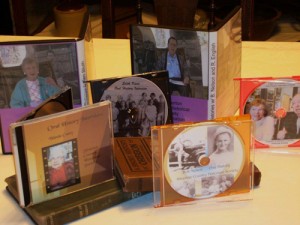By Kathy Cook Hunter
Online visit www.storycorps.net/tools and
other related links such as www.storycorps.org/listen
to learn methods and technological tips.
Silver Falls Library and Salem Public Library
have relevant books in the 808 and 929 sections.
Oral history CDs are available for checkout and
sale at the SCHS museum, 428 S. Water St., Silverton
Ancestry Detectives, a genealogy group, meets
monthly at Silver Falls Library
StoryCorps’ message is “Don’t wait.” The national oral-history project urges people to record true stories – memories, actually – of their favorite relatives, mentors, neighbors and friends, keeping history alive for future generations.
It is all too common for those who remain behind to wonder after someone dies what life held for them, only to realize there’s no longer a way of knowing. Their curiosity will never be satisfied, because the only one who can answer is gone. Without written genealogies or written memoirs the stories vanish.
The increased awareness of the value of oral histories is in the air these days locally, too. Silverton Country Historical Society is avidly seeking out and videotaping longtime area residents in an effort to build a CD library of historical memories.
One need not be a professional interviewer.
Libraries have how-to books on recording or writing memoirs and online, StoryCorps assists with suggestions for questions, recording equipment tips and previous participants’ narratives for inspiration. Country Living magazine in November spotlighted preserving families’ oral histories.
As friends and relatives gather during the traditional holiday season, the opportunity may be ripe to spend an hour exploring someone’s memories of their life.
“My feeling about oral histories is that it doesn’t have to be perfect and you don’t have to follow a format – it’s still valuable,” said Carolyn Hutton, curator at the SCHS museum and veteran interviewer.
Capturing someone’s memories is important, she said, “because once they’re gone, those memories are gone, too.”
But if someone is reluctant to share certain memories, their right to do that should be respected, she said.
“Do tell them they don’t have to answer,” she said. “If you are interviewing a family member it might be best to put that right up front. Some families have bad skeletons…”
Historically oriented, Hutton is most interested in the person’s interaction with their family and the community. She might ask, “Did you have special traditions for the holidays?” She wants them to remember Silverton’s history and how their family fits into it.
She puts people at ease by chatting briefly and explains the recording equipment and what she will be doing.
“Know your equipment and don’t fumble,” she advises. She attempts to give a list of questions to the subject before the interview so he or she will be prepared, and if she refers to a document, such as a deed, she states what it is.
For future reference it is helpful to begin a recorded interview with specifics: who the interviewer is (stating age may be important), the subject, date and location. Imagine someone else is listening, Hutton said, and clarify questions they might have.
She offered other valuable guidelines: “Don’t take over the interview, let them talk.
“Don’t hurry them, give them 10 to 15 seconds if they’re thinking, and if not, go on.
“Limit it to one hour. It’s hard to keep going longer.”
StoryCorps suggests the interviewer think about what he’d like to learn and ask five to 10 questions such as what was the happiest moment of your life, what are you most proud of, what do you want to be remembered for and what are some of the most important lessons you’ve learned in life.
Other interviews might have a chronological basis, such as birthplace, schools attended, military service, marriage data and work experiences.
Try to be sensitive and perceptive, and don’t dredge up pain or embarrassment.
“Why did you never marry?” could well be a difficult subject for someone to discuss. Start with less personal questions, Hutton said, “and the impersonal might cascade into something else.” But if one thinks it’s appropriate, it’s all right to ask, “How does this make you feel?”
After listening closely, engaging the storyteller’s eyes, nodding and smiling throughout the interview, wrap it up by asking if there is something else he or she would like to say. Thank the storyteller, letting him know it was a privilege to listen.
StoryCorps recommends: “Be curious and honest and keep an open heart. Great things will happen.”